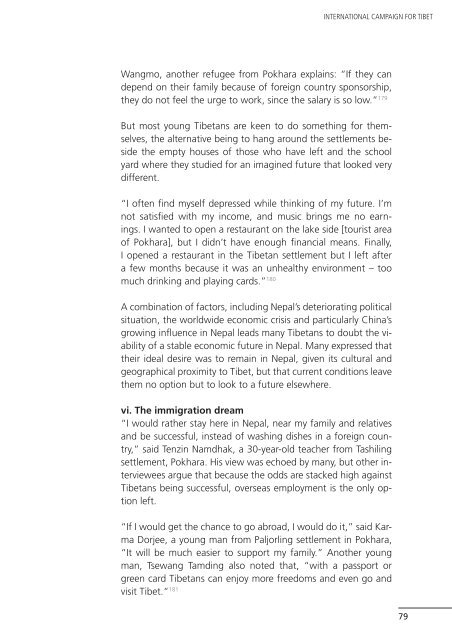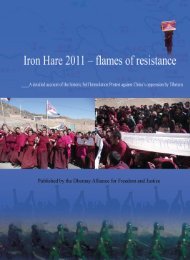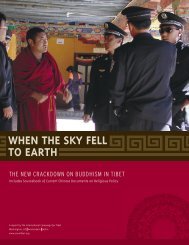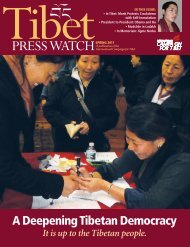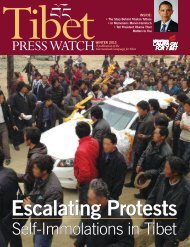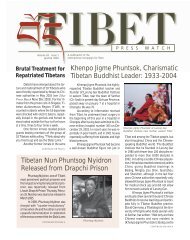DANGEROUS CROSSING: - International Campaign for Tibet
DANGEROUS CROSSING: - International Campaign for Tibet
DANGEROUS CROSSING: - International Campaign for Tibet
You also want an ePaper? Increase the reach of your titles
YUMPU automatically turns print PDFs into web optimized ePapers that Google loves.
INTERNATIONAL CAMPAIGN FOR TIBET<br />
Wangmo, another refugee from Pokhara explains: “If they can<br />
depend on their family because of <strong>for</strong>eign country sponsorship,<br />
they do not feel the urge to work, since the salary is so low.” 179<br />
But most young <strong>Tibet</strong>ans are keen to do something <strong>for</strong> themselves,<br />
the alternative being to hang around the settlements beside<br />
the empty houses of those who have left and the school<br />
yard where they studied <strong>for</strong> an imagined future that looked very<br />
different.<br />
“I often find myself depressed while thinking of my future. I’m<br />
not satisfied with my income, and music brings me no earnings.<br />
I wanted to open a restaurant on the lake side [tourist area<br />
of Pokhara], but I didn’t have enough financial means. Finally,<br />
I opened a restaurant in the <strong>Tibet</strong>an settlement but I left after<br />
a few months because it was an unhealthy environment – too<br />
much drinking and playing cards.” 180<br />
A combination of factors, including Nepal’s deteriorating political<br />
situation, the worldwide economic crisis and particularly China’s<br />
growing influence in Nepal leads many <strong>Tibet</strong>ans to doubt the viability<br />
of a stable economic future in Nepal. Many expressed that<br />
their ideal desire was to remain in Nepal, given its cultural and<br />
geographical proximity to <strong>Tibet</strong>, but that current conditions leave<br />
them no option but to look to a future elsewhere.<br />
vi. The immigration dream<br />
“I would rather stay here in Nepal, near my family and relatives<br />
and be successful, instead of washing dishes in a <strong>for</strong>eign country,”<br />
said Tenzin Namdhak, a 30-year-old teacher from Tashiling<br />
settlement, Pokhara. His view was echoed by many, but other interviewees<br />
argue that because the odds are stacked high against<br />
<strong>Tibet</strong>ans being successful, overseas employment is the only option<br />
left.<br />
“If I would get the chance to go abroad, I would do it,” said Karma<br />
Dorjee, a young man from Paljorling settlement in Pokhara,<br />
“It will be much easier to support my family.” Another young<br />
man, Tsewang Tamding also noted that, “with a passport or<br />
green card <strong>Tibet</strong>ans can enjoy more freedoms and even go and<br />
visit <strong>Tibet</strong>.” 181<br />
79


